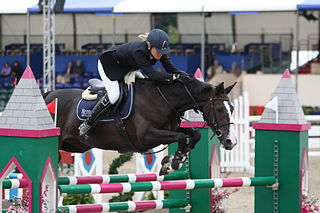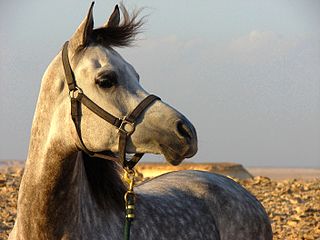
The horse is a domesticated, one-toed, hoofed mammal. It belongs to the taxonomic family Equidae and is one of two extant subspecies of Equus ferus. The horse has evolved over the past 45 to 55 million years from a small multi-toed creature, close to Eohippus, into the large, single-toed animal of today. Humans began domesticating horses around 4000 BCE, and their domestication is believed to have been widespread by 3000 BCE. Horses in the subspecies caballus are domesticated, although some domesticated populations live in the wild as feral horses. These feral populations are not true wild horses, which are horses that never have been domesticated. There is an extensive, specialized vocabulary used to describe equine-related concepts, covering everything from anatomy to life stages, size, colors, markings, breeds, locomotion, and behavior.

Equestrianism, commonly known as horse riding or horseback riding, includes the disciplines of riding, driving, and vaulting. This broad description includes the use of horses for practical working purposes, transportation, recreational activities, artistic or cultural exercises, and competitive sport.

The Arabian or Arab horse is a breed of horse that originated on the Arabian Peninsula. With a distinctive head shape and high tail carriage, the Arabian is one of the most easily recognizable horse breeds in the world. It is also one of the oldest breeds, with archaeological evidence of horses in the West Asia that resemble modern Arabians dating back 4,500 years. Throughout history, Arabian horses have spread around the world by both war and trade, used to improve other breeds by adding speed, refinement, endurance, and strong bone. Today, Arabian bloodlines are found in almost every modern breed of riding horse.

A horse show is a judged exhibition of horses and ponies. Many different horse breeds and equestrian disciplines hold competitions worldwide, from local to the international levels. Most horse shows run from one to three days, sometimes longer for major, all-breed events or national and international championships in a given discipline or breed. Most shows consist of a series of different performances, called classes, wherein a group of horses with similar training or characteristics compete against one another for awards and, often, prize money.

The Selle Français (SF) is a breed of sport horse from France. It is renowned primarily for its success in show jumping, but many have also been successful in dressage and eventing. An athletic horse with good gaits, it is usually bay or chestnut in color. The Selle Français was created in 1958 when several French riding horse breeds were merged into one stud book. The new breed was meant to serve as a unified sport horse during a period when horses were being replaced by mechanization and were transforming into an animal used mainly for sport and leisure.

Equestrian sports were first included in the Olympic Games in the Summer Olympics of 1900 in Paris. They were again included in 1912, and have been included in every subsequent edition of the Games. The Olympic equestrian disciplines are dressage, eventing, and show-jumping. In each discipline, both individual and team medals are awarded. Women and men compete on equal terms.
Equestrian Canada, formerly known as Equine Canada and commonly known by its acronym, EC, is Canada’s comprehensive national governing body for equestrian sport. It is the executive branch of Canada's Olympic and Paralympic equestrian teams; the national association and registry of Canadian equestrian athletes; the national regulatory body for equestrian coaches, competition organizers, and judges; and the national federation of Canadian horse breeders and Canadian breed registries.

This is a basic glossary of equestrian terms that includes both technical terminology and jargon developed over the centuries for horses and other equidae, as well as various horse-related concepts. Where noted, some terms are used only in American English (US), only in British English (UK), or are regional to a particular part of the world, such as Australia (AU).

Saudi Arabia competed at the 2012 Summer Olympics in London, from 27 July to 12 August 2012. This was the nation's tenth appearance at the Olympics, except the 1980 Summer Olympics in Moscow, because of its partial support to the United States boycott.
Abdullah Waleed Al Sharbatly is a Saudi Arabian equestrian who competes in the sport of show jumping. He is mostly known because of his win of the individual silver medal at the 2010 FEI World Equestrian Games. He was part of the Saudi team that won the bronze medal at the 2012 Summer Olympics.
The Specialized Criminal Court (SCC) is a non-Sharia court created in Saudi Arabia in 2008 that tries suspected terrorists and human rights activists. On 26 June 2011, the court started trials of 85 people suspected of being involved in Al-Qaeda in the Arabian Peninsula and the 2003 Riyadh compound bombings and in September 2011 another 41 al-Qaeda suspects appeared in the court. In the same year, the court held trial sessions of human rights activists, including co-founder Mohammed Saleh al-Bejadi of the Saudi Civil and Political Rights Association (ACPRA) and Mubarak Zu'air, a lawyer for long-term prisoners, and Khaled al-Johani, who spoke to BBC Arabic Television at a protest in Riyadh, thus becoming known as "the bravest man in Saudi Arabia". The court convicted 16 of the human rights activists to sentences of 5–30 years' imprisonment on 22 November 2011.
Abdullah bin Mutaib Al Saud is a Saudi Arabian show jumping rider and member of House of Saud.

HH Prince Faisal Al Shalan is a Saudi Arabian equestrian rider. He won several medals in show jumping events, including gold for the national equestrian team, at the 2011 Pan Arab Games in Doha, Qatar. He also earned a silver medal in team jumping at the 2014 Asian Games in Incheon, South Korea.

The Canadian Equestrian Team or CET collectively describes the athletes that represent Canada at the highest levels of international equestrian competition, specifically at the World Championship, Olympic, and Paralympic levels.
Nathalie Morin is a Canadian citizen, born in Quebec, who has been living in Saudi Arabia with her partner, Saeed Al Shahrani since 2005. She claims that she is physically and psychologically mistreated with her four children. She has stated that she "does not have any friend[s]" in Saudi Arabia and is shunned because of her foreign roots. She refuses to leave Saudi Arabia as her husband has custody of their children.
Ali Mohammed Baqir al-Nimr is a Saudi Arabian former political prisoner who participated in the Saudi Arabian protests during the Arab Spring as a teenager. He was arrested in February 2012 and sentenced to death in May 2014, having previously awaited ratification of his sentence by King Salman of Saudi Arabia, which was to be carried out by beheading and crucifixion respectively. Ali's trial was considered unfair by Professor of Human Rights Law Christof Heyns, and Amnesty International, as well as French President François Hollande and Prime Minister Manuel Valls, who called for the execution to be stopped.
Mohamed Naâmani is an Algerian professional footballer who currently plays as a defender with MC Oran.

Equestrianism have a major economic and cultural significance in Qatar. After the Emirate gained its independence in 1971, the Al Thani family invested to make Qatar one of the major players in horse racing and equestrian sports. The Qatar Racing and Equestrian Club (QREC) was created in 1975, and the prestigious Al Shaqab stables were created in 1992. Qatar now has top-level jockeys and world-renowned purebred Arabian horses. Since the 21st century, it has been organizing highly endowed horse races and important equestrian sports competitions, such as the Global Champions Tour, and international endurance riding competitions. While equestrianism remains less prominent than in neighboring Arab states, the sovereign family still aims to invest heavily in this field. The sudden burst of Qatar on the international equestrian scene is also followed by controversy due to cases and suspicions of doping, especially in endurance and horse racing.













